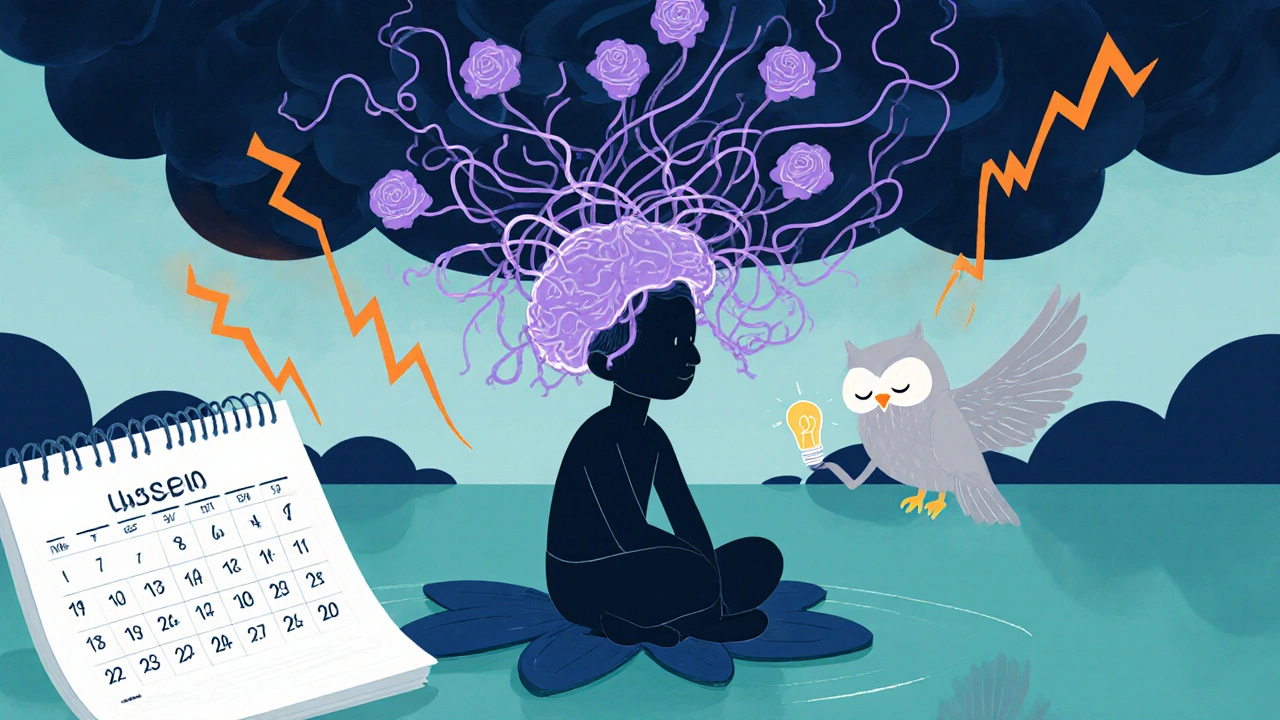Disulfiram & Mental Health Medication Comparison Tool
Personal Assessment
Answer the following questions to understand your potential risks with alcohol use disorder medications.
Your Results
Based on your responses, here's a comparison of the best medication options for your situation.
When you hear the name Disulfiram, most people think of a pill that makes drinking alcohol feel terrible. What many don’t realize is how that reaction can ripple into a person’s mental health. This article breaks down what Disulfiram does, why it can affect mood and thoughts, and what steps you or a loved one can take to stay balanced while using it.
What is Disulfiram?
Disulfiram is a medication approved for supporting abstinence in people with alcohol use disorder (AUD). First marketed in the 1950s, it works by blocking the enzyme aldehyde dehydrogenase. When someone drinks after taking Disulfiram, acetaldehyde builds up, causing flushing, nausea, and rapid heartbeat. The uncomfortable reaction is meant to act as a deterrent.
Disulfiram is taken once daily, usually 250 mg, but dosages can range from 125 mg to 500 mg depending on the prescribing doctor’s plan. It’s available by prescription only and requires a clear commitment to avoid alcohol, even in sauces, mouthwashes, or certain cough syrups.
The Overlap Between Alcohol Addiction and Mental Health
Alcohol use disorder and mental‑health conditions often co‑exist. Research from the National Institute on Alcohol Abuse and alcoholism shows that roughly 30 % of people with AUD also meet criteria for depression, and a similar share struggle with anxiety. The relationship works both ways: drinking can worsen mood, while low mood can drive drinking as a form of self‑medication.
Because Disulfiram forces a break from alcohol, it can expose underlying mood issues that were previously masked by the substance. That’s why clinicians stress close monitoring, especially in the first few weeks of treatment.
Psychiatric Side Effects Linked to Disulfiram
While the “hangover” reaction to alcohol is well known, a less‑talked‑about set of side effects involves the brain’s chemistry. Below are the most frequently reported mental‑health changes:
- Depression: Feelings of sadness, loss of interest, and low energy may appear or intensify. A 2022 Australian survey of 312 patients on Disulfiram found 12 % experienced new‑onset depressive symptoms within the first month.
- Anxiety: Restlessness, racing thoughts, and panic attacks can surface, especially when the patient worries about accidental alcohol exposure.
- Psychosis: Rare but serious, hallucinations or delusional thinking have been documented in case reports, usually at higher doses or when combined with other neurotoxic substances.
- Suicidal ideation: Any sudden increase in thoughts of self‑harm should trigger immediate medical attention.
The exact mechanism isn’t fully settled, but one theory points to Disulfiram’s impact on dopamine pathways. By inhibiting dopamine‑β‑hydroxylase, the drug may shift the balance between dopamine and norepinephrine, influencing mood and alertness.

Who Is Most at Risk?
Not everyone who takes Disulfiram will develop mental‑health problems. Certain factors raise the odds:
- Pre‑existing psychiatric diagnosis (e.g., major depressive disorder, generalized anxiety disorder).
- High daily dose (>400 mg) or rapid dose escalation.
- Concurrent use of other psychotropic medications that affect dopamine or serotonin.
- Severe liver disease, which can alter drug metabolism and increase brain exposure.
- Recent withdrawal from alcohol, as the brain is already destabilized.
Clinicians often run a brief mental‑health screen before starting Disulfiram. Tools like the PHQ‑9 for depression and the GAD‑7 for anxiety are quick, validated questionnaires that fit into a typical office visit.
Managing Mental Health While on Disulfiram
The goal is to keep the person sober and emotionally stable. Here’s a practical roadmap for patients, families, and healthcare providers:
- Baseline assessment: Document mood, anxiety level, and any prior psychosis. Note medications, liver function tests, and support systems.
- Regular check‑ins: Schedule appointments every 2‑4 weeks for the first three months. Use PHQ‑9 and GAD‑7 at each visit.
- Education: Explain the warning signs-persistent low mood, panic attacks, strange thoughts-and stress the importance of reporting them promptly.
- Therapeutic support: Combine Disulfiram with counseling, such as Cognitive Behavioral Therapy (CBT) or Motivational Interviewing. These approaches teach coping skills that reduce reliance on alcohol.
- Medication review: If depression or anxiety spikes, consider adding an antidepressant (e.g., sertraline) after checking for drug interactions.
- Alternative anti‑craving meds: For those who can’t tolerate psychiatric side effects, Naltrexone or Acamprosate may be safer options (see comparison table).
- Emergency plan: If suicidal thoughts appear, set up a rapid response protocol-call a crisis line, go to the nearest emergency department, or contact the prescriber immediately.
Family members play a key role, too. They should stay alert for changes in behavior and encourage open conversation about feelings.

How Disulfiram Stacks Up Against Other Anti‑Craving Medications
| Medication | Primary Action | Psychiatric Side Effects | Major Contraindications | Typical Dose |
|---|---|---|---|---|
| Disulfiram | Aldehyde dehydrogenase inhibition (creates aversive reaction) | Depression, anxiety, rare psychosis, suicidal ideation | Severe liver disease, hypersensitivity, active alcohol use | 250 mg daily (range 125‑500 mg) |
| Naltrexone | Opioid receptor antagonist (reduces reward) | Generally low; occasional irritability | Liver failure, opioid dependence, pregnancy | 50 mg daily (oral) or 380 mg monthly (injectable) |
| Acamprosate | Modulates glutamate & GABA (stabilizes brain chemistry) | Minimal; rare anxiety increase | Severe renal impairment, hypersensitivity | 666 mg three times daily |
Choosing the right drug depends on the person’s liver health, mental‑health history, and preference for daily pills versus monthly injections.
Quick Checklist for Patients & Clinicians
- Confirm liver function tests are within safe limits before starting.
- Screen for depression and anxiety using PHQ‑9/GAD‑7.
- Discuss potential psychiatric side effects openly.
- Set up a monitoring schedule: at least every 2 weeks initially.
- Arrange counseling (CBT, Motivational Interviewing) alongside medication.
- Know the emergency contacts: crisis helpline, nearest ER, prescriber.
- Re‑evaluate medication choice if mood worsens or side effects become intolerable.
Following this list reduces the chance of surprise mood swings and keeps the treatment on track.
Bottom Line
Disulfiram can be a powerful ally in staying sober, but it can also stir up mental‑health issues, especially when alcohol is suddenly removed from the picture. By checking baseline mood, scheduling regular follow‑ups, and pairing the pill with therapy, most people can navigate the ups and downs safely. If psychiatric symptoms flare, there are alternative meds that may suit the individual better. The key is open communication and vigilant monitoring.
Can Disulfiram cause depression?
Yes. About one in ten patients report new‑onset depressive symptoms, especially in the first few weeks. The risk rises if the person already has a history of mood disorders.
What should I do if I feel anxiety while taking Disulfiram?
Talk to your prescriber right away. They may adjust the dose, add a short‑term anxiety medication, or suggest a different anti‑craving drug. Meanwhile, use relaxation techniques and avoid any hidden sources of alcohol.
Is it safe to combine Disulfiram with antidepressants?
In most cases, yes. SSRIs like sertraline have no known interaction with Disulfiram. However, your doctor should review liver function and monitor for any unexpected side effects.
What are the signs of a psychiatric emergency on Disulfiram?
Persistent suicidal thoughts, hearing voices, extreme agitation, or sudden inability to function are red flags. Call emergency services immediately and inform your prescribing clinician.
Are there alternatives if I can’t tolerate Disulfiram’s mental‑health effects?
Yes. Naltrexone and Acamprosate are approved for alcohol‑use disorder and have much lower rates of psychiatric side effects. Discuss with your doctor which option fits your health profile.


Comments (13)
Devendra Tripathi
Disulfiram is just a gimmick; real change comes from counseling, not a chemical scare tactic.
Ericka Suarez
Yo, you think a pill is a gimmick? In the *great* fight against booze, Disulfiram is a weapon-don’t be so clueless!
Casey Cloud
Disulfiram works by blocking aldehyde dehydrogenase which makes drinking cause nasty hang‑over symptoms. It’s prescribed once a day and the dose can be adjusted between 125‑500 mg. Because the aversive reaction is predictable, many clinicians use it as a deterrent while patients engage in therapy. Monitoring mood with PHQ‑9 and GAD‑7 in the first weeks is essential since underlying depression can surface. If anxiety spikes, an added short‑term anxiolytic may be considered after ruling out interactions. Always keep a list of alcohol‑containing products out of the house.
Rachel Valderrama
Wow, thanks for the PhD lecture, Casey-who knew a single pill could need a therapist on speed dial?
Brandy Eichberger
I must commend the author for weaving together clinical data and practical advice with such finesse; the checklist alone is a masterstroke for any practitioner.
Eli Soler Caralt
Ever wonder if the mind, like a river, simply mirrors the chemicals we feed it? Disulfiram nudges the current, revealing hidden rocks of anxiety that were once submerged 🌊🤔. Perhaps the true cure lies not in the drug but in our willingness to stare at those shadows.
eric smith
Listen, the philosophy won’t change the biochemistry-Disulfiram blocks an enzyme, period. All the poetry in the world can’t stop acetaldehyde from piling up, so stop romanticizing side effects.
Eryn Wells
Hey everyone, let’s remember that while the science is solid, each person’s journey is unique 🌈. If someone feels uneasy, encouraging them to speak up can make all the difference.
Kathrynne Krause
Alright folks, grab that checklist and own your recovery! You’ve got the tools, the support, and the fire-let’s turn those cravings into conquered milestones!
Vivian Annastasia
Sure, the article sounds polished, but it conveniently glosses over how pharma profits from pushing another “miracle” pill onto vulnerable patients.
John Price
Interesting read.
Nick M
The whole Disulfiram saga is a textbook case of Big Pharma’s covert agenda. They market it as an “anti‑craving” solution while secretly collecting data on patient compliance. Every time a patient logs a PHQ‑9 score, a data point is fed into a massive analytics engine owned by the same conglomerate that manufactures the drug. That engine then churns out algorithms to predict who will buy the next overpriced medication. What’s more, the FDA’s “approval” process is riddled with revolving‑door appointments that favor industry lobbyists. The label warnings about depression are deliberately vague, ensuring lawsuits are rare and settlements are minimal. Meanwhile, the pharmaceutical reps are incentivized to push doctors toward higher doses, which statistically correlates with increased psychiatric side effects. Those side effects, in turn, create a new market for antidepressants, another gold‑mining product line. It’s a self‑reinforcing loop that the industry has refined over decades. The article’s checklist sounds helpful, but it’s essentially a compliance tool to keep patients in the system. By scheduling bi‑weekly PHQ‑9s, clinicians are unwittingly feeding the surveillance network. And let’s not forget the covert sponsorship of “independent” research that quietly validates Disulfiram’s efficacy. All this is packaged in glossy language to lull the public into a false sense of security. If you strip away the marketing veneer, you see a profit‑driven mechanism masquerading as medical care. So before you swallow another 250 mg tablet, ask who really benefits from your sobriety.
Erika Thonn
In the grand tapestry of health, perhaps profit and healing dance together, knitting shadows into bright threads-though my brain sometimes trips over the words.